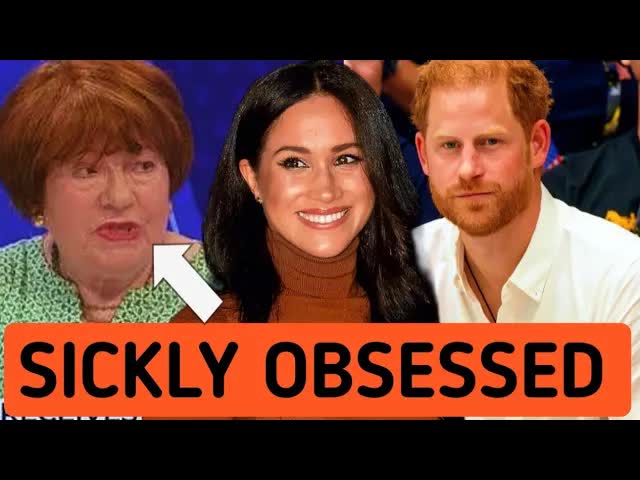In today’s deep dive, we’re peeling back the layers on some dubious claims made by royal commentator Angela Levin regarding the Duke and Duchess of Sussex.
Levin has been making headlines with her assertions about Harry and Meghan, particularly suggesting that they are filled with regret over their decision to step back from royal duties.
But is there any truth to her claims, or are they simply a product of speculation?
Angela Levin is no stranger to the royal scene; she’s been a prominent voice analyzing the British monarchy for years.
However, her recent commentary has taken a rather questionable turn, especially concerning the lives of Harry and Meghan.
Levin insists that the couple is lamenting their departure, painting a picture of them yearning for their former royal lives.
But is that really the case?
Observing Harry and Meghan since their exit from royal duties tells a different story.
They seem to be embracing their newfound freedom with enthusiasm.
From launching exciting projects to engaging in meaningful causes, the couple appears to be thriving outside the royal spotlight.
Their smiles and public interactions suggest liberation rather than remorse.
Levin’s portrayal of the Sussexes as regretful diminishes the courage they demonstrated in making such a significant life change.
It undermines their quest for a more fulfilling existence that aligns with their values.
This narrative isn’t just harmless speculation; it’s a calculated move aimed at discrediting Harry and Meghan and skewing public perception.
Let’s take a closer look at Levin’s assertion that Meghan is consumed by regret.
This claim seems utterly unfounded when we consider the joy and empowerment she has exhibited since leaving royal life.
Public appearances, heartfelt speeches, and advocacy work showcase a woman who is not only content but flourishing in her independence.
Meghan’s passionate address at the Global Citizen Live concert stands out as a clear demonstration of her commitment to her causes and her exhilaration in speaking freely.
Likewise, Harry has been increasingly open about mental health, a cause he deeply champions, showcasing a relaxed demeanor that suggests he, too, is thriving.
Their relocation to California, where they have established their home and the non-profit organization Archewell, highlights their desire for a nurturing environment for their children.
Moreover, lucrative deals with Netflix and Spotify have provided them with financial independence while allowing them the creative freedom to pursue projects that resonate with them.
Levin’s narrative of regret seems to be an attempt to fit Harry and Meghan into a box that simply doesn’t align with reality.
This story not only disrespects their agency but also perpetuates harmful stereotypes about their relationship dynamics.
It’s an unfair representation that fails to acknowledge their individual growth and choices.
Delving deeper reveals Levin’s biases, particularly her tendency to vilify Meghan for supposedly Americanizing Harry.
Such comments carry xenophobic undertones and reflect a lack of respect for the couple’s individual paths.
Furthermore, Levin often downplays Harry’s autonomy, suggesting he is merely following Meghan’s lead, which undermines his capacity for independent thought.
Levin’s selective criticism of the Sussexes is telling, as she frequently overlooks the Royal Family’s own deviations from tradition while fixating on the Sussexes’ choices.
This inconsistency points to a personal bias that clouds her judgment, leading to a skewed portrayal of the couple’s actions.
Moreover, Levin’s refusal to recognize the positive contributions made by Harry and Meghan—such as their philanthropic efforts and advocacy for mental health—further illustrates her bias.
This omission creates a distorted narrative that serves her agenda rather than portraying the truth.
As consumers of media, it’s crucial to remain vigilant against misinformation.
Levin’s unfounded claims not only harm Harry and Meghan but also distort public perceptions.
Misinformation can manipulate opinions and create divisions, ultimately undermining trust in the institutions involved, including the Royal Family.
In this age of information overload, discerning fact from fiction is more important than ever.
When faced with misleading narratives, we must question, investigate, and seek out the truth.
By doing so, we protect our understanding and uphold the integrity of public discourse.
The journey we’ve undertaken today has been about unearthing the truth behind Levin’s claims.
Instead of depicting a couple steeped in regret, we see Harry and Meghan as individuals who are radiant, content, and thriving in their new life.
This stark contrast to Levin’s narrative underscores the importance of critical thinking and the need to challenge biases in media reporting.
